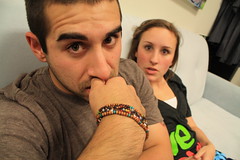
Does a company have to be the “world’s best” when it comes to customer service? Sometimes striving to be at the pinnacle of greatness is not always necessary and can be way too expensive. Consider the companies that state their customer service representatives will answer the phone within three rings. Will answering the phone on the third ring and spending money on more employees make customer service more effective than hiring less employees and answering the phone perhaps by the tenth ring? Even stretching that one step further; how many times have you called an office and the human receptionist asked you to “please hold” for a few moments? Would it be better customer service if the company hired another receptionist to answer the phone so the “please hold” would never happen? Is that really cost-effective if the phones rarely back up? Many companies don’t use humans anymore, and phone systems now require us to push “one” for Mr. Hughes, push “two” for Ms. Greene, and you know the rest. Meanwhile, we are waiting for a longer period of time than if the receptionist was still answering the phone.
That’s the paradox of customer service. Customers want faster service, more conveniences, better service payment plans, options, return policies, less wait time and all of their problems solved. Have I missed anything? The problem is that what customers expect is different from what they get.
In the case of an airline carrier and an expected flight at an expected time, how often does the airline meet those expectations? We don’t want to wait for the flight since our promised time was already set, but we expect to wait because that is what we have experienced. We’re not happy with in, and when we contact the customer service representative we are angry and ready to explode.
If perception defines a customer’s expectations which is not compatible with the realities of the company, it is inevitable that the customer’s perception will not be fulfilled. This creates the necessity for a company to have a recovery system. Service failures provide opportunities for companies to create customer loyalty, and provide a chance for higher satisfaction than if the failure never happened. A good recovery can turn frustrated and angry customers into loyal customers just by creating good-will. In the case of the airlines, complimentary upgrades, complimentary food, written apologies, and complimentary flights will not ensure that the next flight is going to be on time, but it surely will calm the savage beasts.
photo credit: Thriving Ink




Very well written, your concerns are right-on, and your analysis of what to do is correct, but this is not a paradox – rather, it highlights gap analysis. Expectation gaps and performance gaps.
The essence of paradox theory is that, given a maxim or universal truth, the polar opposite of that theorem is also true. Sort of like theoretical physics of philosophy.
Check out my posting re “The Paradox of Customer Service” at http://www.scottmattisonllc.blogspot.com. I would like to read your reaction to what I have written.
Thanks.